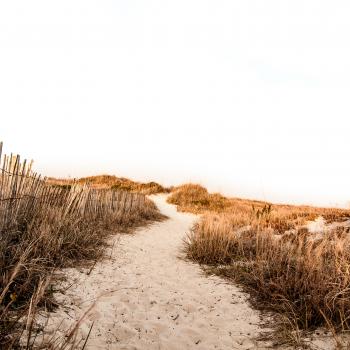To celebrate Image’s twenty-fifth anniversary we are posting a series of essays by people who have encountered our programs over the years.
My first task at Image was to write to Ray Bradbury. That, I told my disbelieving self, was my job: to send proof pages of new work to the man whose old work so absorbed me at fifteen that all I could do for a year was write version after watered-down version of Dandelion Wine.
What saved my cover letter from devolving into a Chris Farley SNL sketch (“You remember when you said the birds scattered like skipped stones across the inverted pond of heaven? Yeah…that was…that was awesome.”) was my overweening desire not to be sent home on the very morning I began acting as managing editor of Image: A Journal of the Arts and Religion.
Luckily for me, my predecessor, Richard Wilkinson, had left some ready language in the Dell, and I was able to maintain my position.
Close to six, Image’s founder Greg Wolfe returned from his think-tank day job somewhere in the woods of Delaware and invited me to join him and his wife Suzanne in their living room for drinks. To accomplish this, I walked all of thirty feet. In those days, the whole of Image’s office space comprised Greg’s study, next to the family laundry room.
As Suzanne wrote and took care of their son Ben, who was still in diapers, and as the rest of the Wolfe clan was at school, I’d recline in Greg’s blanketed rocker to read submissions, or slouch on the metal folding chair that faced a blank wall and a black monitor, to work on business.
As I sipped my red wine, Greg and Suzanne regaled me with stories of the British-loyalist history of the township my fiancé and I had just traveled 1,173 miles to reach, and extolled the stark wonders of Wyeth country, which existed, tantalizingly, well within driving distance, and brought me up to speed about my new hometown’s mushroom festival (an annual affair that included a parade and the election of a mushroom queen).
Every bit of it was fascinating or hilarious—for this was Greg and Suzanne Wolfe talking—but all the same, I felt my attention grow increasingly divided by the irresistible fact that the room in which we sat composed far less than half the available space. The lion’s share—lined with heavy, identical cases—was devoted entirely to books. No other furniture cluttered that part of the room, and no windows broke the lines of shelves: just a skylight glowing with late afternoon, and the whole of the vast interior open to it: hardwood floors, exposed beams.
I’m tempted to say it had the look of Montaigne’s tower, or of a particularly extended and well-preserved branch of an Oxford college library, but all I could have told you then, after Greg sensed my mind’s direction and ushered me past an invisible threshold, was that it had the feeling, for me, of something altogether more sacred.
“Feel free,” Greg said, “to read whatever you’d like.”
You know that poem by Robert Hass, where his friend gives up academic life for farming, and, discovering the exigencies of survival, begins “to read The American Sheepman with an intensity of concentration he had never even approximated when he was reading political theory for his Ph.D. orals”?
Replace the Sheepman with Maritain, or with The Chicago Manual of Style, or with the weathered hardback Greg found for me at a yard sale, James J. Kilpatrick’s The Writer’s Art, and Hass’s struggling companion was me during my first few years out of grad school, in Kennett Square, Pennsylvania.
I read as though my life depended on it. I still do.
Each September, when I return my high school students’ first essays of the year, I make a point of telling them a story about Greg Wolfe. “I want you to write a review for the magazine,” Greg wrote in an email later that first week. “Choose a couple books you love.” And so I took down my copy of Effort at Speech by William Meredith, as well as Laura Fargas’s An Animal of the Sixth Day, from which Sanda and I had recently selected a poem, “October-Struck,” for our wedding invitations.
I read and read. I plumped the margins with ink. And then I wrote my words, the best I could imagine. Seventeen hours later, Greg gave my pages back, accompanied by a single-spaced, printed letter nearly as long as the piece I’d given him. He praised what deserved to be praised, and took the rest—which was nearly everything—apart: sentences that wandered from native intent, phrases that hoped to make their way on charm alone, images that, if they knew any ideas at all, knew them only in passing.
I was, to say the least, upset. Every teacher since I’d been ten had praised my prose! Why, one professor in college even said…
I vented. Sanda commiserated. And then I got to the work at hand. I considered every query Greg wrote, and thus was led to more precise attendance to the turns of phrase and thought within my work. At long last, I began to see my words not as tender nerves composing precious me, but as versions of a medium within which I worked and lived, out there, in here, to be formed in accordance with reality I’d perceived.
A month later, my piece was put into print. I held the issue again and again, reviewing the familiar table of contents, turning to the memorized page. It was the best thing I’d ever written.
That was seventeen years ago. The same age as some of my students. The magazine’s now about the age I was when I got there.
“This is where we’ll talk in an essential way,” I say to my students about their writing, and about my snaking comments that inevitably encircle the whole of each page’s rectangles of text. “The amount I write is a measure of my engagement with your writing,” I tell them. “Greg Wolfe made me a better writer because he paid attention to what I wrote.”
In August, my wife and daughter and I flew to Philadelphia for a family reunion. Afterward, we drove down to Kennett. We showed Madeleine the almost hilariously narrow row house where her mom and dad first lived together. We showed her the outside of the Half-Moon Saloon, and the empty space where once there stood a store that rented videotape copies of movies. We lamented the loss of the old library building, and laughed at the endurance of the combination Taco Bell/KFC. And then we turned the corner onto Broad Street.
It was smaller than I’d remembered, the house that held the space that’s grown to hold nearly every living writer and artist that I love, imaginative space that essentially holds me still.
William Coleman has served as managing editor for Image and executive editor of nonfiction for DoubleTake. A former teaching fellow at Harvard University, he teaches literature and writing for Northfield School of the Liberal Arts, in Wichita, Kansas. His poems have been published in Poetry, The Paris Review, The New Criterion, Image, Western Humanities Review, Phoebe, Third Coast, and other publications. His book and music reviews have been published in Image and The Martha’s Vineyard Times, respectively. His poetry manuscript, Once I Held a Stone, was a finalist for the 2012 Emily Dickinson First Book Award.
















